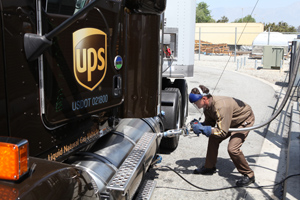Natural Gas for Heavy-Duty Trucks Could Increase Global Warming, New Report Says

A switch to cleaner-burning natural gas as a fuel for heavy-duty trucks could increase global warming due to the release of methane at drilling sites and the fact that natural gas-powered engines get fewer miles per gallon than traditional diesel-powered engines, according to a report issued May 19 by the Environmental Defense Fund.
“Natural-gas trucks have the potential to reduce overall climate impacts compared to diesel, but only if we clean up the highly potent greenhouse-gas emissions from the systems that produce and deliver the fuel,” said Jonathan Camuzeaux, co-author of the report and a senior economic analyst at EDF in Washington, D.C.
The report drew a critical response from Matthew Godlewski, president of Natural Gas Vehicles for America, a trade group that is collaborating with EDF and others to study the issue of methane leaks.
“It’s confusing that the Environmental Defense Fund has chosen to conduct and release another study, outside of the cooperative work already underway,” Godlewski said in a statement.
An estimated 6.3 metric tons of methane — a primary component of natural gas — escaped into the atmosphere from wells and gas pumping stations in 2013, according to the U.S. Environmental Protection Agency.
In addition, natural-gas truck engines are typically 5% to 15% less efficient than diesel engines because of differences in the energy content of the fuel.
Unless steps are taken to minimize methane leaks and improve fuel efficiency of natural gas-powered trucks, EDF officials said the conversion from diesel could lead to greater warming for the next 50 to 90 years before eventually providing a net climate benefit.
Although natural-gas vehicles use just 0.1% of the natural gas consumed in the United States, the number could rise significantly if fleets step up purchases, EDF officials said.




